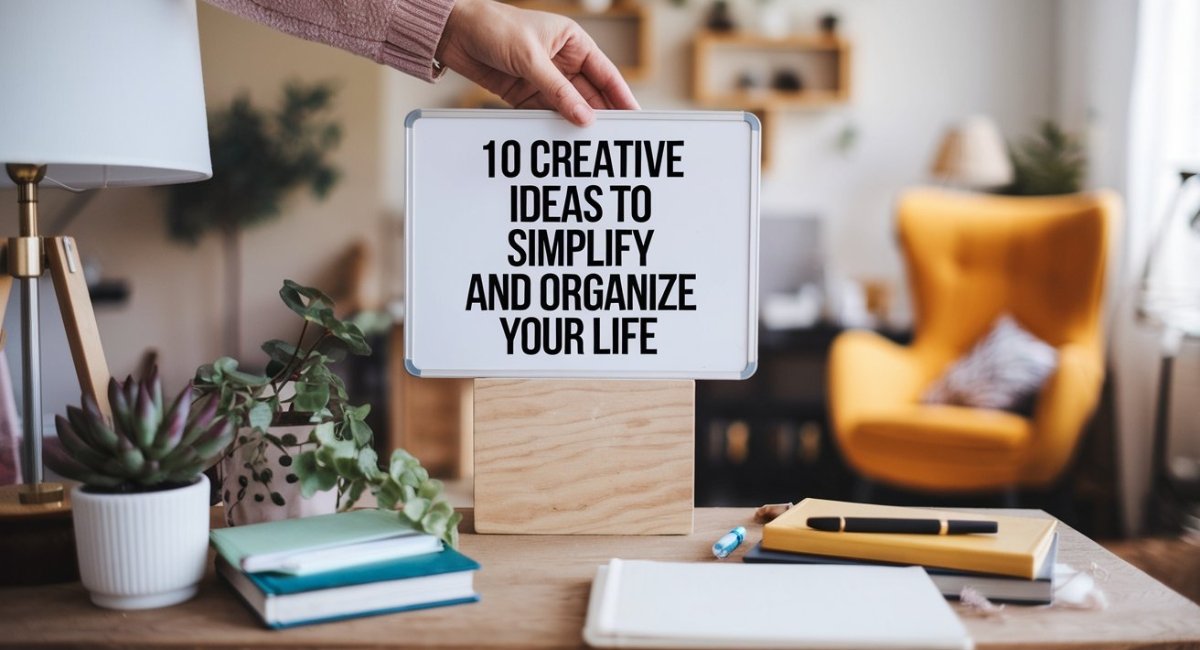25 Affordable Ways Busy Moms Can Practice Self-Care
This post contains paid and/or affiliate links. I make a small commission at no extra cost to you. Please see our Privacy Policy.
Life can feel like a whirlwind, full of tasks and to-do lists. Simplifying and organizing your life brings clarity and joy. Busy moms can recharge with easy, low-cost self-care ideas.
Try journaling, quick walks, soothing baths, or a quiet moment with tea. Simple actions can restore balance and well-being.
Let’s look at creative ways to make your daily routine smoother and keep chaos away.
1. Create a Command Center
Choose a spot in your home as a command center. It could be a bulletin board or a desk for your calendar and important papers. This spot will help you stay organized and plan your day.
2. Adopt the 5-Minute Rule
Do tasks that take less than five minutes right away. This includes things like hanging up your coat or washing dishes. Doing small tasks quickly stops them from piling up and feeling overwhelming.
3. Utilize Digital Tools
Use apps to help you stay organized. Apps like Trello for projects, Evernote for notes, and Google Calendar for scheduling can keep you on track. They help you manage your tasks and responsibilities.
4. Declutter Regularly
Keeping your space clutter-free helps clear your mind. Spend 15 minutes each week tidying up. Focus on one area at a time, sorting items into keep, donate, and toss boxes. Regular cleaning keeps your space organized.

5. Meal Prep for the Week
Plan and prep meals for the week on the weekend. Chop veggies, portion snacks, and cook grains in bulk. This saves time and reduces stress from daily cooking.
6. Simplify Your Wardrobe
Consider a capsule wardrobe with versatile pieces. This makes mornings easier and saves time on laundry. You’ll also enjoy mixing and matching outfits.
7. Establish Routines
Routines add structure to your day. Morning and evening routines are very helpful. Morning routines can include simple tasks like making your bed. Evening routines help you reflect and prepare for tomorrow.
8. Automate Bill Payments
Set up automatic payments for bills. This avoids late fees and stress. Review your expenses monthly to stay on top of your finances.
9. Practice Mindfulness
Take a few minutes each day for mindfulness. This can be through meditation, journaling, or deep breathing. A clear mind leads to a more organized life.

10. Learn to Say No
Review your commitments and prioritize your time. Saying no to non-essential tasks frees up time for what matters. This helps you focus on your interests and maintain a balanced life.
By using these ideas, you can make your daily tasks simpler and boost your productivity. Remember, organization is about creating a system that works for you. Start with small steps, and you’ll see a big difference in your daily routine.
“You can’t pour from an empty cup—take a moment to refill yours with simple self-care.”
The Impact of Minimalism on Daily Well-Being
In today’s world, minimalism offers a way to improve daily well-being. It changes how you see your surroundings and life. By simplifying your belongings and commitments, you gain clarity, focus, and peace. Let’s see how minimalism can enhance your daily life.
Clear Space, Clear Mind
Minimalism teaches us to declutter our spaces. This makes our homes and work areas calm and clear. Studies show that a tidy space lowers stress and boosts mood. Here’s how a clean space helps us feel better:
- Reduces Anxiety: Clutter can stress us out. A minimalist space helps us feel less overwhelmed.
- Enhances Productivity: With fewer distractions, we focus better on our tasks.
- Promotes Mindfulness: A minimalist space makes us appreciate what we have, not what we don’t.

Intentional Living
Minimalism isn’t just about fewer things. It’s also about using our time and energy wisely. Here are some key points:
- Prioritization: Minimalism helps us see what’s truly important, leading to more meaningful experiences.
- Mindful Consumption: We learn to make thoughtful choices about what we buy, reducing waste and promoting sustainability.
- Quality Over Quantity: Choosing fewer, better things often makes us happier.
Emotional Well-being
Embracing minimalism can deeply improve our emotional health. Here are some benefits:
- Increased Joy: Surrounding ourselves with things we love brings joy and contentment.
- Reduction in Overwhelm: Having fewer choices simplifies life, making us feel less burdened.
- Strengthened Relationships: Focusing less on stuff helps us connect deeper with loved ones.
Financial Peace
Financial stress can harm our well-being. Minimalism teaches us to spend smarter. Here’s how it can bring financial peace:
| Minimalism Strategy | Financial Benefit |
|---|---|
| Buying Less Stuff | Less money spent and less debt |
| Focusing on Experiences | More happiness from meaningful experiences than from stuff |
| Long-term Investments | Better financial planning and savings |
Improved Mental Health
Minimalism can also boost our mental health. By clearing our physical and mental spaces, we improve our mindset:
- Less Comparisons: Focusing on the essentials reduces our need to compare ourselves to others.
- Strengthened Resilience: A minimalist lifestyle builds resilience, helping us face challenges more easily.
- Encouragement of Self-Discovery: With less clutter, we can discover what we truly enjoy and value.
“Prioritizing yourself doesn’t require much—start with a quiet moment, a deep breath, or a kind thought.”
A Path Towards Sustainability
Minimalism often goes hand in hand with sustainability. It encourages us to own less and value quality, helping our planet. Here’s how minimalism supports sustainability:
- Reduces Waste: Buying less means less waste, which is better for our environment.
- Encourages Resourcefulness: Minimalists find creative ways to use items instead of throwing them away.
- Supports Ethical Brands: Minimalists often choose companies that care about sustainability and ethics.
Adding minimalism to our lives can greatly improve our daily happiness. It simplifies our surroundings and thoughts, bringing us clarity and peace. In today’s world, minimalism is more than a trend. It’s a way of living that helps us thrive emotionally, financially, and environmentally.

Conclusion
Starting a journey to simplify and organize your life can change your daily life a lot. By using the 10 creative ideas shared, you can make your space and mind clearer.
Every step, from cleaning your home to making daily routines, makes life easier and more fun.
Minimalism is a big part of this change. By getting rid of too much stuff, you make room for what’s important.
This could be spending time with family, doing hobbies, or just enjoying quiet moments. With fewer distractions, you can focus on taking care of yourself and finding peace.
The path to simplifying is unique and keeps going. Begin with one or two ideas that appeal to you, and then add more.
It could be organizing your digital life or setting limits on your time. Small steps can make a big difference in your daily life.
As you simplify, notice how your mood changes and how you feel lighter. A clean and organized environment leads to more creativity, productivity, and happiness. Embrace these ideas and see how minimalism improves your well-being.
Commit to it—you deserve a life that’s organized, enriching, and fulfilling.



